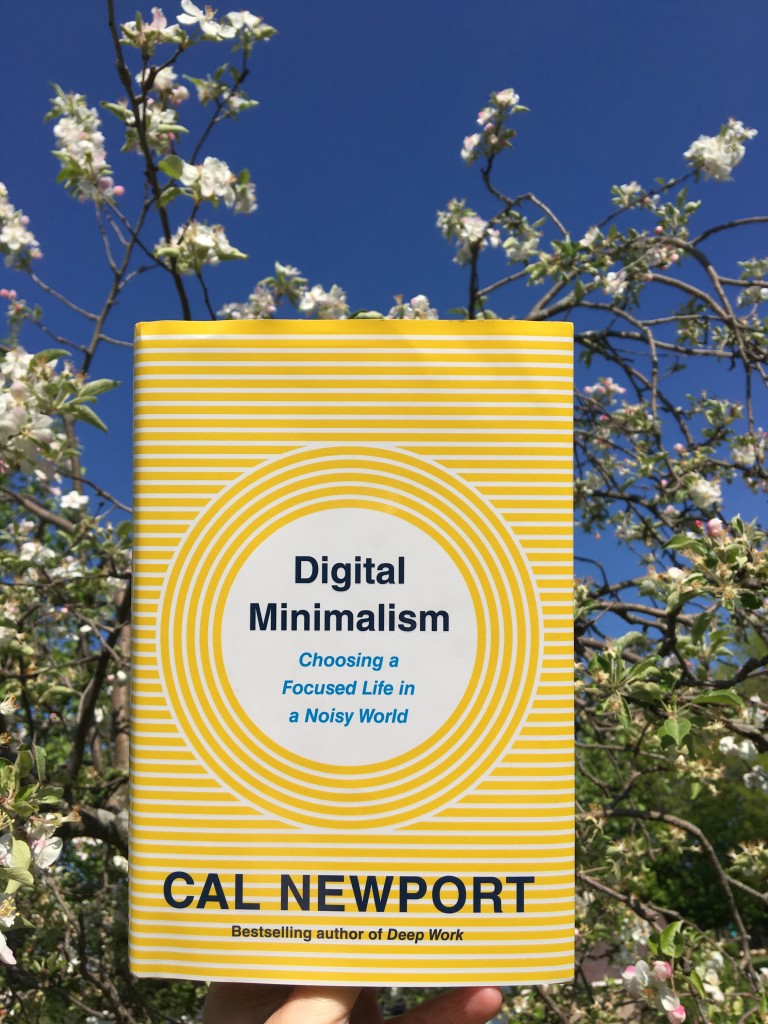
Some people discover an incredible band, buy all their albums, attend their concerts, and watch for everything new they create.
That’s kind of how I am with author Cal Newport. ?
I first connected with Newport when he spoke at a coaching conference I attended a few years ago. Since then, I have read, written about, and shared his books all over the place. I am what you might call a super-fan.
His latest book, Digital Minimalism, arrived at a time when I actually didn’t think I needed it. I have felt pretty intentional with my screen time lately. But, in typical Newport fashion, he made me look at my practices from an entirely new perspective and challenged me to alter my behavior in order to live and work with greater intention.

Newport is an associate professor of computer science at Georgetown and the author of Deep Work, a WSJ best-seller and one of my all-time favorite books. But don’t bother looking him up on Twitter or Facebook – he does not have a presence there. After you read Digital Minimalism, you may choose to let go of yours, too – or at least change the way you use them.
Newport doesn’t guilt-trip or judge those who spend extensive time online, but he doesn’t sugarcoat things, either. Research on the effects of social media – just like social media itself – is new, but doesn’t look promising: We compulsively check our devices. We are losing our ability for solitude, uninterrupted thought, and extended focus to accomplish challenging tasks. We – including children – are seeing an epidemic of anxiety, loneliness, and social comparison.
“People feel as though they are ceding more and more of their autonomy when it comes to deciding how they direct their attention,” he writes. “They joined [social media platforms] to stay in touch with friends across the country, and then ended up unable to maintain an uninterrupted conversation with the friend sitting across the table.”
The internet likely isn’t going anywhere, nor do we necessarily want it to. But we do need to reclaim our ability to decide how we use it. Below, I share my two biggest takeaways from the book (and believe me, I had many).

1. Let Your Core Values Guide You.
Simply implementing a few hacks (turning off notifications, for example) isn’t enough to actually change our experience. “What you need instead,” shares Newport, “is a full-fledged philosophy of technology use, rooted in your deep values.”
I couldn’t agree more. I cannot think of a single aspect of work or life that isn’t made stronger – and in many cases, easier – by knowing our core values, then acting in accordance with them. In the case of digital presence, Newport offers a few questions to ask yourself before hopping back online:
a. Does this technology directly support something I deeply value?
b. If yes, is this technology the BEST way to support this value?
c. If yes, how am I going to use this technology going forward to maximize its value and minimize its harms?
You might think clicking “Like” effectively lets your cousin know you are happy about his award, for example. But what if you sent a handwritten note instead? What if you invited him out for a celebratory lunch? Consider taking a conscious step off of autopilot, reassessing your values, then moving forward with clarity and integrity.

2. Be Intentional.
Take an honest look at the role of social media in your life, then intentionally decide how – and how much – life energy (time, mental capacity, and so on) you will dedicate to it.
This may require a significant mindset shift, but a highly worthwhile one. Less FOMO, less comparison, less worrying about whether something you posted was taken the wrong way. More focus, more meaningful accomplishment, greater autonomy.
For a while, I thought, “But I’m a business owner. I have to have a steady online presence or potential clients won’t know about me.” In reality, however, the time I need to spend online for business reasons is minimal, yet I often found myself lost in the rabbit-hole of distraction. When used well, social media can serve as a wonderful tool for connection; on the other side of the coin, it can also promote mindlessness, procrastination, and fuel our insecurities.

After reading Deep Work, I changed the way I utilize my time; after Digital Minimalism, I changed the way I use the internet. Both have led to powerful, positive results.
I am still active on Instagram, Facebook, and LinkedIn, and I enjoy these services for connecting with family and clients, learning from others, and hopefully inspiring positive action – part of my life purpose. But I now feel much more focused and intentional with how I use these platforms, rather than hopping on any time I find myself with a few minutes to spare.
I highly recommend Digital Minimalism – as well as Deep Work, So Good They Can’t Ignore You, and pretty much anything else you can find from Cal Newport (he has appeared on many podcasts lately, too). And although he likely won’t see my praise of his work on Instagram and elsewhere, I hope that *you* benefit from this recap and recommendation. Feel free to let me know your takeaways – either from this blog or Digital Minimalism!
Get coaching tips, special offers, and become part of our positive, purposeful community! Click here and fill in the blue box or send us an email!





